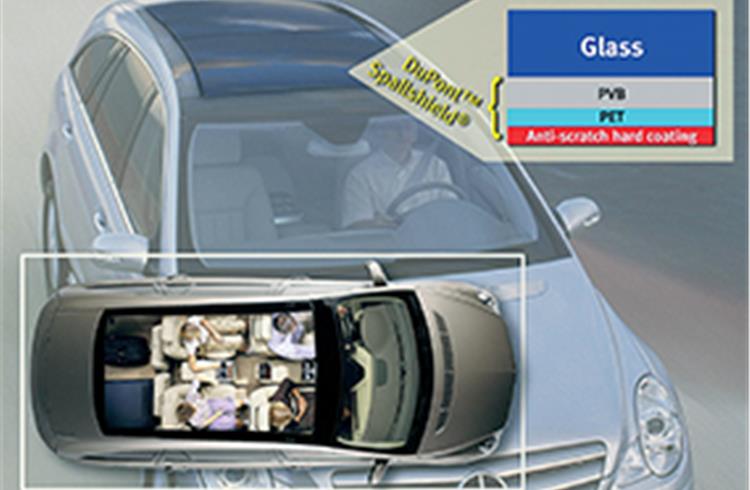DuPont introduces Spallshield safety glass
DuPont has introduced its Spallshield composite interlayer technology, which can enable use of laminated glass with improved protective capabilities and reduced weight.
"This is an excellent example of DuPont materials science enabling improved protection,” said Craig Binetti, vice-president and general manager – DuPont Packaging & Industrial Polymers. “As we continue to see the need for increasing safety in automobiles, we have a number of exciting research developments in light control, lightweighting and new structural materials that can improve passenger comfort and safety.”
The first-generation Spallshield is a plastic composite (of PolyVinyl Butyral film and Polyethylene Terepthalate (PET) and that provides up to eight times the impact performance of standard laminated glass. Two layers of plastic are laminated to a single layer of glass with the plastic on the inside, protecting passengers from glass shards from exterior impact and from the potential of ejection in the event of a roll-over accident. By essentially eliminating one layer of glass from a standard glass laminate and replacing it with an abrasion-resistant polyester film, weight reductions of up to 30 percent can be achieved. The technology has already been adopted by DaimlerChrysler for its Mercedes S and R-Class vehicles.
RELATED ARTICLES
Bosch hydrogen engine tech-powered truck to be on Indian roads this year
The global supplier of technology and services is betting big on both electromobility and hydrogen. While announcing the...
IIT Bombay inaugurates Arun Firodia Research Floor
IIT Bombay, one of India’s top technical and research institutions, honours Kinetic Group chairman Dr Arun Firodia, one ...
Maruti Suzuki expands capacity at Manesar plant by additional 100,000 units
New assembly line at Plant A expands total manufacturing capacity at the Manesar plants to 900,000 units per annum. Alon...





 By Autocar Pro News Desk
By Autocar Pro News Desk
 21 Aug 2006
21 Aug 2006
 7246 Views
7246 Views









